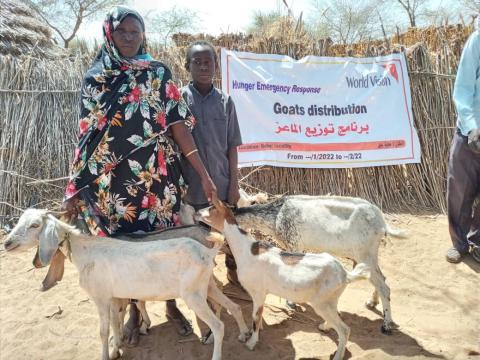World Vision livelihoods programme is helping improve family’s food security and income

Four years ago, as the Darfur crisis intensified, Suad Shogar’s husband left in search of better economic opportunities. Suad was left with seven children to raise on her own. To make ends meet, Suad worked as a casual labourer in neighbouring farms. These opportunities were scarce and often paid poorly leaving Suad struggling to take care of her family.
Suad is a participant in World Vision’s hunger response income generating activities programme. The programme is aimed at building the resilience of communities by providing vulnerable individuals with skills, technologies and the start-up capital necessary for them to sustainably grow food or start income generating activities.
The particular income generating activity is decided by the community following a participatory process. Suad’s village chose goat keeping as their income generating activity and each of the 200 participating households received five goats.
The five goats Suad received have reproduced and she now has seven goats that have helped improve her children’s nutrition and her income.
“I am grateful to World Vision for coming out to a remote village like ours to give us goats. The goats are providing milk for my children which has improved their health and I am able to make some money from selling milk. Before this project, me and my children had nothing. Thanks to World Vision, our life has become better,” says Suad.
Over 71,000 people have benefitted from World Vision’s livelihoods programme in 2022. All participants are trained on the different livelihoods opportunities and provided with the necessary start-up inputs including livestock, seeds, tools and equipment.